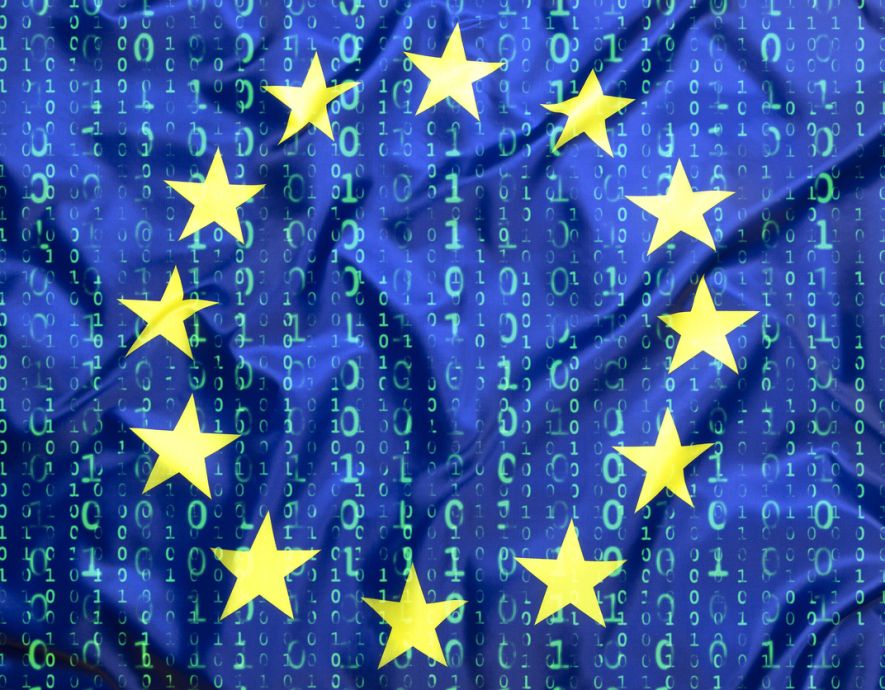
- Home
- Digital Sovereignty
- One out of ten French companies uses sovereign collaborative solutions
One out of ten French companies uses sovereign collaborative solutions


Conformist choices, a lack of knowledge, beliefs in less efficient features and higher prices: sovereign collaborative solutions still have many obstacles to overcome before they can gain market share from American tech giants, according to a study by Jamespot and Poll&Roll.
Where do French administrations and companies stand in terms of digital sovereignty and, more specifically, in terms of collaborative tools? This was the question posed by Jamespot, a French publisher of SaaS-based collaborative software, for the second edition of its study entitled « Outils collaboratifs souverains: Qu’en pensent les entreprises françaises en 2023 ? » and carried out in partnership with Poll&Roll, a platform of automated quantitative market studies.
The first finding of this report devoted to French companies’ perceptions and knowledge of sovereign collaborative tools is that the notion of sovereignty is well entrenched among the 200 companies in the sample who responded to the survey. 93% of respondents know what digital sovereignty is. The rate rises to 100% if we focus on the HR directors and 98% of the IT directors polled. Nearly two-thirds of respondents (59%) report they even know exactly what it means. This represents a nine-point increase over the previous year.
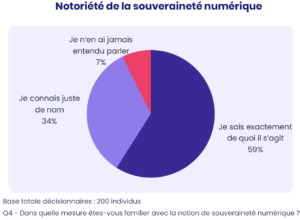
Digital sovereignty’s reputation
I have never heard of it : 7%
I have heard of the term : 34%
I know exactly what it means : 59%
Sample of decision-makers: 200 individuals
Q4 – To what extent are you familiar with the concept of digital sovereignty?
« We carried out this study because a lot of people talk about the issue of digital sovereignty but don’t necessarily measure it precisely. This subject is often approached from a qualitative rather than quantitative point of view. We focused our study primarily on the opinions of decision-makers in order to highlight their views on the subject, » says Alain Garnier, Jamespot’s chairman and co-founder.
Furthermore, the study reveals that 80% of decision-makers agree on the importance of digital sovereignty, with a quarter of them even stating that it is paramount. More than ever, digital sovereignty also seems to be a differentiating factor for companies.
The vast majority (64%, i.e. almost two-thirds of respondents) feel that the choice of whether to equip themselves with such a tool, whether French or European, is theirs to make. Only 21% of those surveyed believe that this decision should be dictated by national laws, while 15% of respondents feel that the issue should be legislated at the European level.
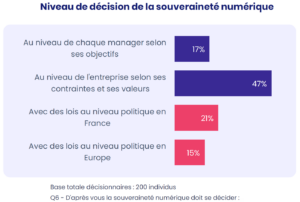
Who should make decisions on digital sovereignty
By each manager according to their goals: 17%
By each company according to its values and constraints: 47%
With laws at the political level in France: 21%
With laws at the political level in Europe: 15%
Sample of decision-makers: 200 individuals
Q6 – In your opinion, digital sovereignty should be decided
Obstacles to overcome
The study also shows that the share of companies using sovereign solutions is still low. Despite the market remaining under the heavy influence of American collaborative solutions, 11% of respondents report having adopted sovereign tools. « This figure may seem low, but it is actually an excellent signal that should gradually encourage other French companies to adopt such solutions. It shows that we can forego collaborative tools from outside Europe! » says Alain Garnier.
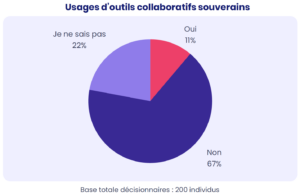
Use of sovereign collaborative tools
I don’t know: 22%
Yes: 11%
No: 67%
Sample of decision-makers: 200 individuals
The main reason driving organizations to prefer American collaborative tools is the fact that « everyone uses them » (32%). A third of respondents also state that they lack information on the sovereign offering (31%). This figure is down slightly from 2022 (34%), a reward for French and European publishers’ efforts to make themselves known. 27% of decision-makers also consider that sovereign tools’ features are not at the same level as those from American solutions – this percentage should be considered in light of the lack of knowledge of these tools.
The last obstacle concerns pricing: national tools are considered to be too expensive (26% of respondents compared to 14% in 2022). « When I saw this result, I laughed. I would love to be more expensive than our American competitors, that would mean that the user price would be higher, but that’s not the case. When we deploy in the public sector, it is very often for budgetary reasons. These are contracts where we are priced lower than American tech giants, » says Alain Garnier.
Jamespot’s boss continued. « So there’s a confusion with what happens in real life, where everyone is convinced that, because it’s made in France, it’s going to cost more. In the digital sector, US tech firms employ engineers that they pay more than elsewhere, and their marketing is so expensive that they are, in any case, more expensive than their competitors. »
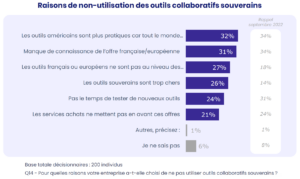
Reasons for not using collaborative tools
American tools are more practical because everyone…: 32%
Lack of knowledge of the French/European offering: 31%
French and European tools are not at the same level as…: 27%
Sovereign tools are too expensive: 26%
No time to test new tools: 24%
Purchasing departments do not promote these offers: 21%
Other, please specify : 1%
I don’t know: 6%
Sample of decision-makers: 200 individuals
Q14 – For what reasons did your company decide not to use sovereign collaborative tools?
Corporate social networks overtake intranets
Once again this year, the most widely used collaborative tools are messaging, videoconferencing and office automation, which remain in the top three places in this order. However, compared with last year, corporate social networks are progressing, overtaking intranets and project management tools. This trend can be explained by the fact that intranets are moving towards an increasingly collaborative model.
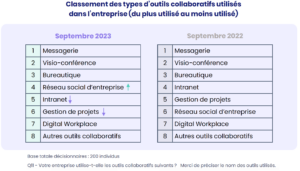
Ranking of the types of collaborative tools used in businesses
September 2023
September 2022
Messaging
Videoconferencing
Office automation
Corporate social network
Intranet
Project management
Digital workplace
Other collaborative tools
Sample of decision-makers: 200 individuals
Q11 – Does your company use the following collaborative tools?
« This new study is very encouraging for publishers of sovereign collaborative solutions like Jamespot. The message is getting through, without a doubt. The French Tech ecosystem must continue to be active and make itself known to companies. The « Je choisis la French Tech » initiative will be an interesting springboard to build on. However, although companies have become aware of the benefits and importance of digital sovereignty, there is still a gap between willingness and action, » adds Alain Garnier.
Jamespot’s cofounder concluded. « When you have a solution that is actually functional, better priced and sovereign, then you have the wind at your back. But if, for example, your solution is more complex or more expensive than the others, then decision-makers will back off. So, there is a balance to be found between these three points. This is one of the lessons of the study and is crucial for any European player. »
the newsletter
the newsletter


